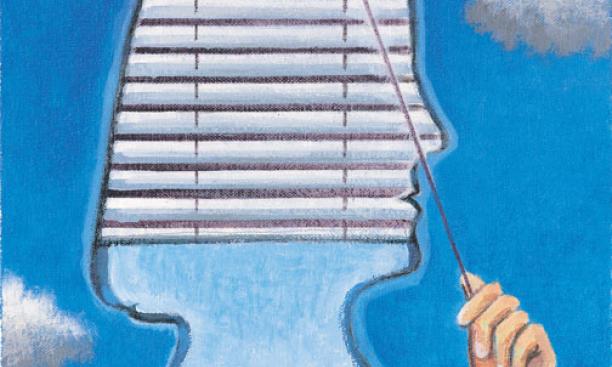

On Thursday night of the first Princeton Preview weekend in April, with the campus crawling with prospective students, about 50 people sat quietly in the usually chatter-filled Café Vivian of Frist Campus Center. A young man was reading aloud the true story of a Princeton graduate student who, in an attempt to control her anxiety and depression, takes to burning herself.
Titled “Dried Dandelions,” the story is one of nine works of poetry and prose published in Uninvisible, a 28-page anthology of student writings centered on psychological health put out by the Healthy Minds Advisors, a student group dedicated to raising awareness and reducing stigma around issues of mental health on campus.
Lasha Clarke ’10, Healthy Minds president, spearheaded the solicitation of submissions to Uninvisible and oversaw its publication along with Univer-sity Health Services. “We wanted to put the anthology out to give students a voice to express things we don’t talk about in classrooms,” Clarke said.
She said she hopes Uninvisible serves as a form of healing self-expression for its contributors and helps readers to find resources and a sense of community on campus.
Uninvisible contains an essay on battling the “anxiety beast,” a poem on mood stabilizers, and the text of a letter written two days before a suicide attempt. Some of the works list authors, but most are anonymous.
The Café Vivian reading was part of a mental-health awareness event organized by a small group of graduate students for a Woodrow Wilson School course on leadership. The event also included musical performances and a talk by Jamie Tworkowski, founder of To Write Love on Her Arms, a nonprofit that helps people battling depression and self-injury.
Graduate student Jamie Davies O’Leary said the group was inspired to spotlight mental-health problems because they seldom are discussed on campus. University spokeswoman Cass Cliatt ’96 said in an e-mail that University Health Services sees 18 to 20 percent of the student body a year for various counseling services, including mental-health screenings.
“It’s a prevalent issue, and people don’t realize it,” O’Leary said.
By Melinda Baldwin GS
Several months ago, a Ph.D. candidate at Princeton had an idea for a feature inThe Daily Princetonian: an anonymous Q&A column that would answer some of the most frequent questions he overheard about grad students. He pitched the concept to the Prince editorial staff, and the “Ask a Grad Student” column was born.
The Prince’s mysterious new contributor, whose work appears every other week in the Street section, signs his columns simply as “Anonymous Graduate Student” (we’ll call him “AGS” for short). So far, AGS has answered questions ranging from “I hear rumors about a grad-student bar. What’s it like?” to “I’m thinking of becoming a grad student. Any advice?”
“It seemed like something that needed to be written,” AGS said in an interview with PAW. “Grad students are a quiet presence on campus, and they go home at the end of the day and don’t have much contact with undergrads. The column is a way to inform that divide.”
“Ask a Grad Student” mixes humor and honesty, and AGS aims to give his readers a funny yet truthful glimpse into graduate life at Princeton. In his first column, he described the D-Bar as “sort of a dive bar for graduate students,” adding that patrons discuss “normal bar stuff” such as “work, significant others, and how stupid rational-choice theory is.” A subsequent column sagely advised seniors to apply for Ph.D. programs only if “you love academic inquiry and can’t imagine a life that doesn’t involve it.”
His favorite question so far, he said, was whether preceptors know when their students are only pretending they did the reading. His answer: “Yeah, we know. We’d really like to call you out on it, too, but you punks write our teaching evaluations, so we usually restrain ourselves.”
AGS has guarded his identity carefully — so far only two friends know he’s the one behind “Ask a Grad Student.” Being anonymous “allows me to be funny in ways that are not quite so politically correct,” he said. See, for example, his warning to students who try to fake their way through precept: “Revenge comes in the form of your participation grade.”
